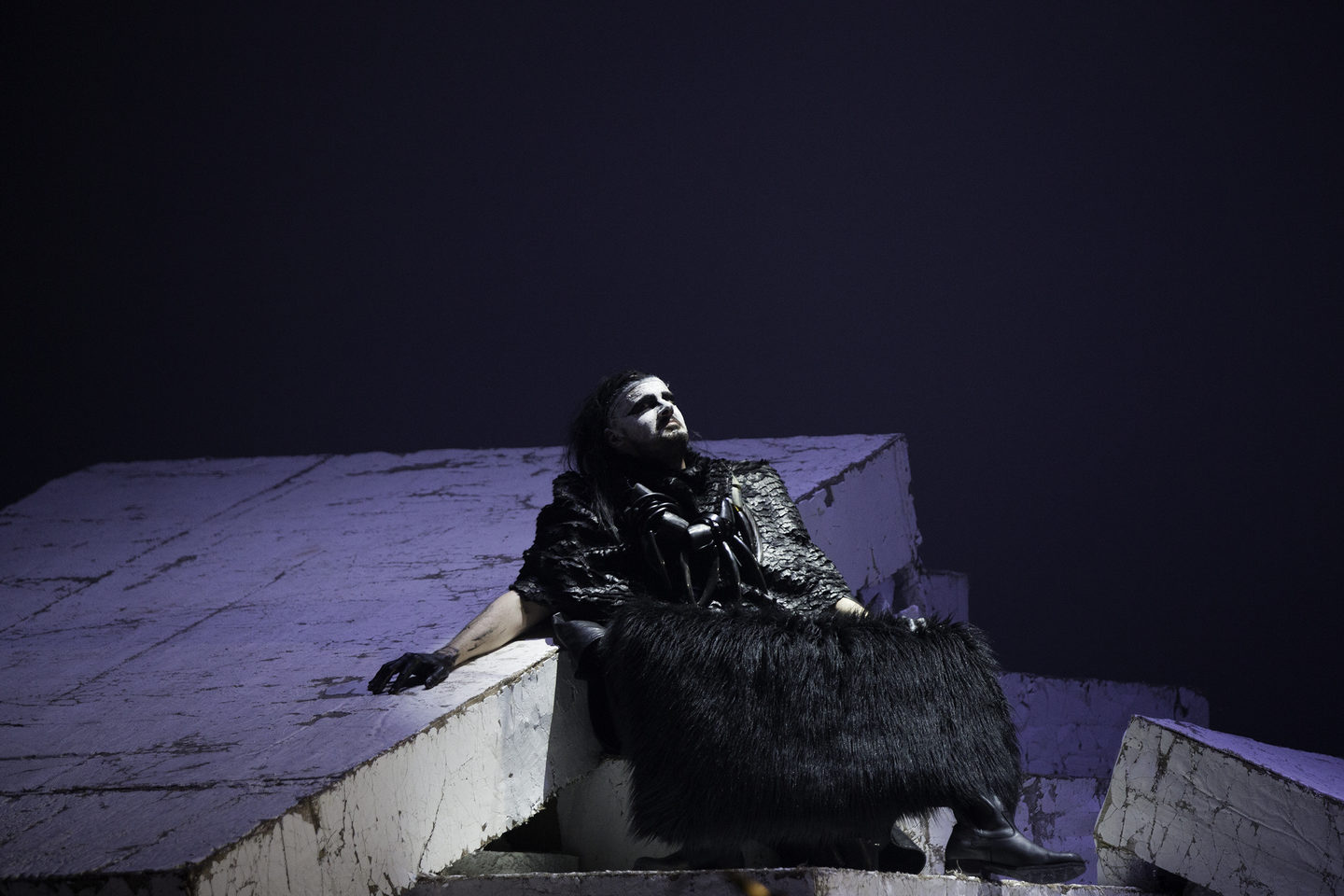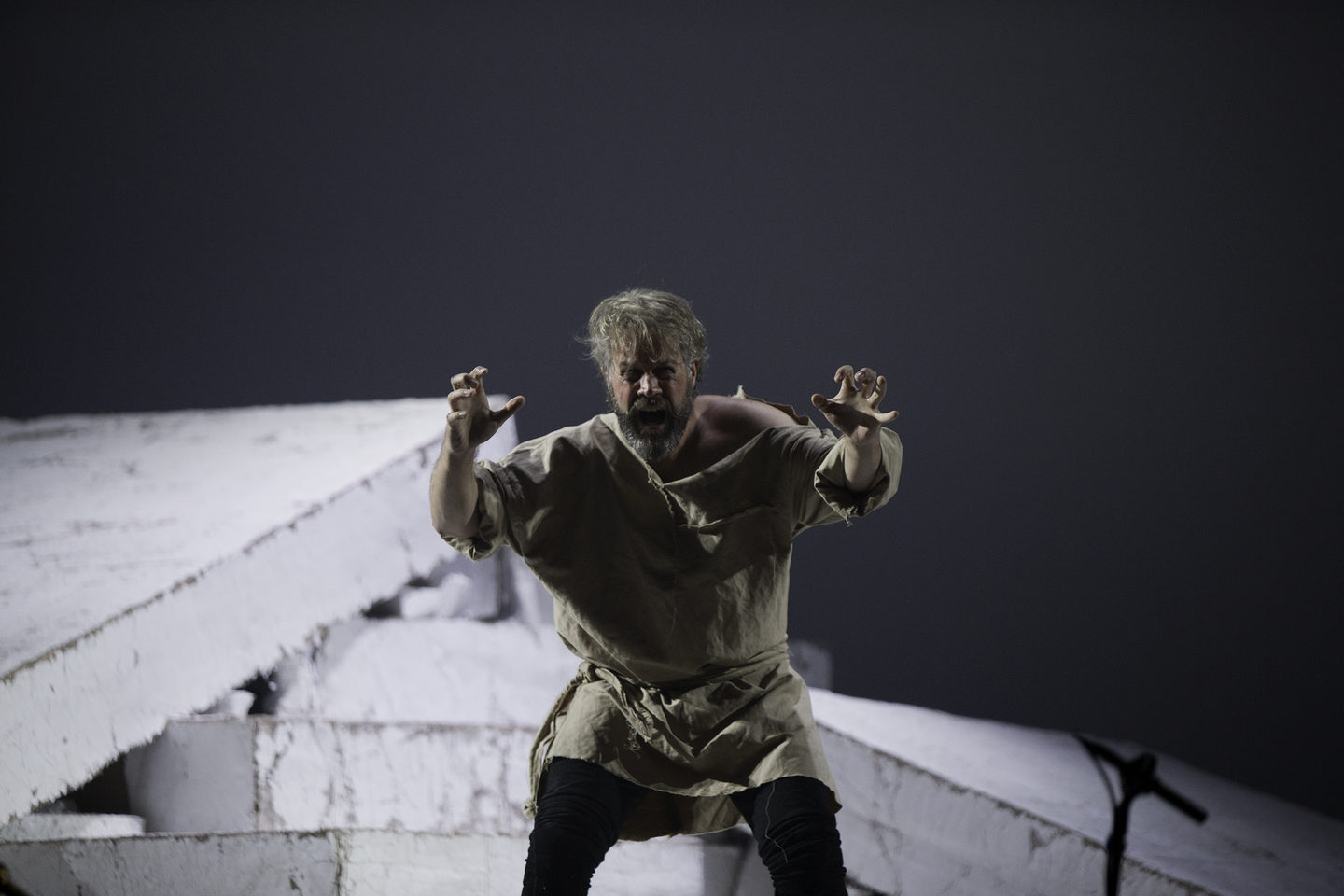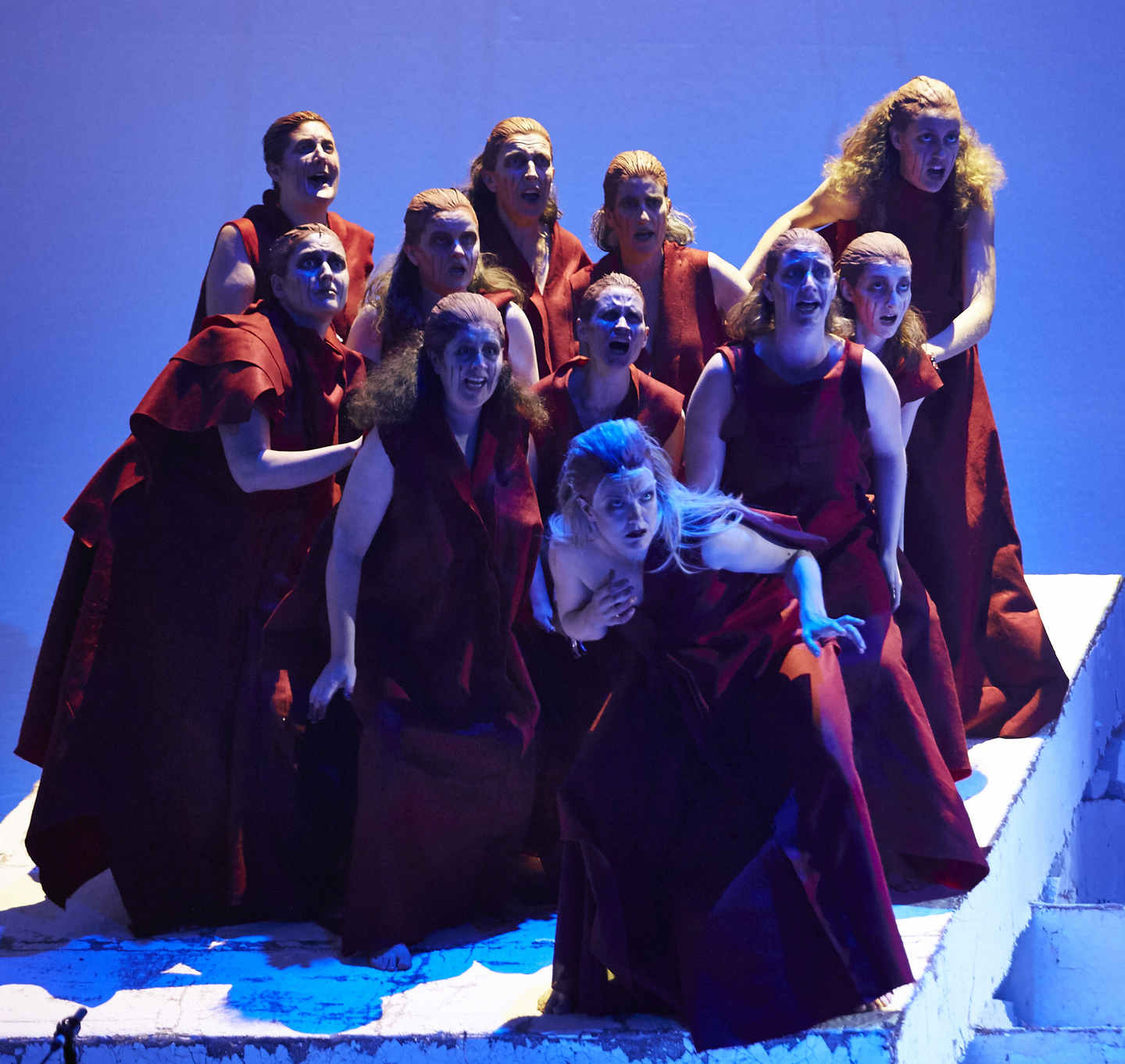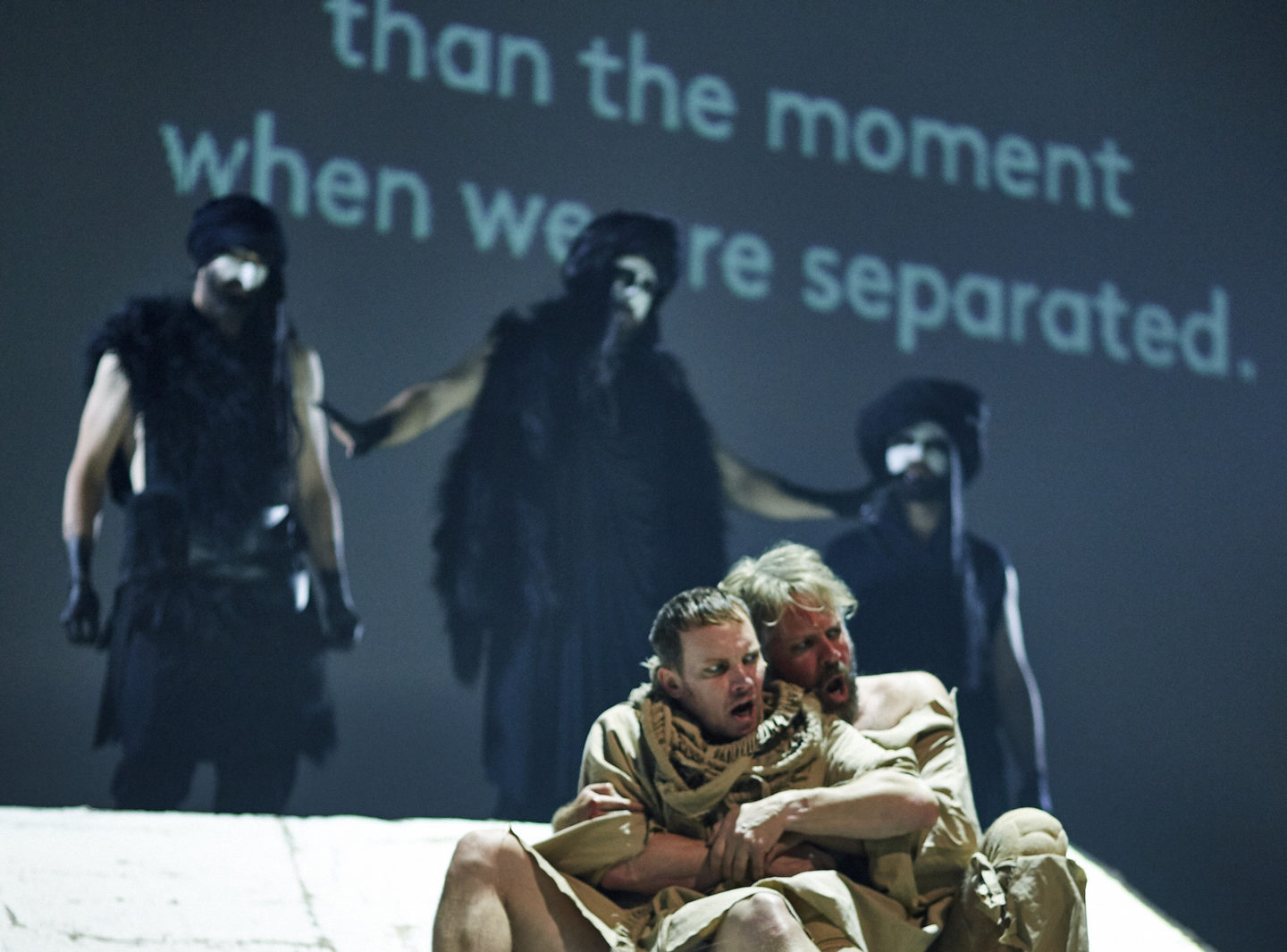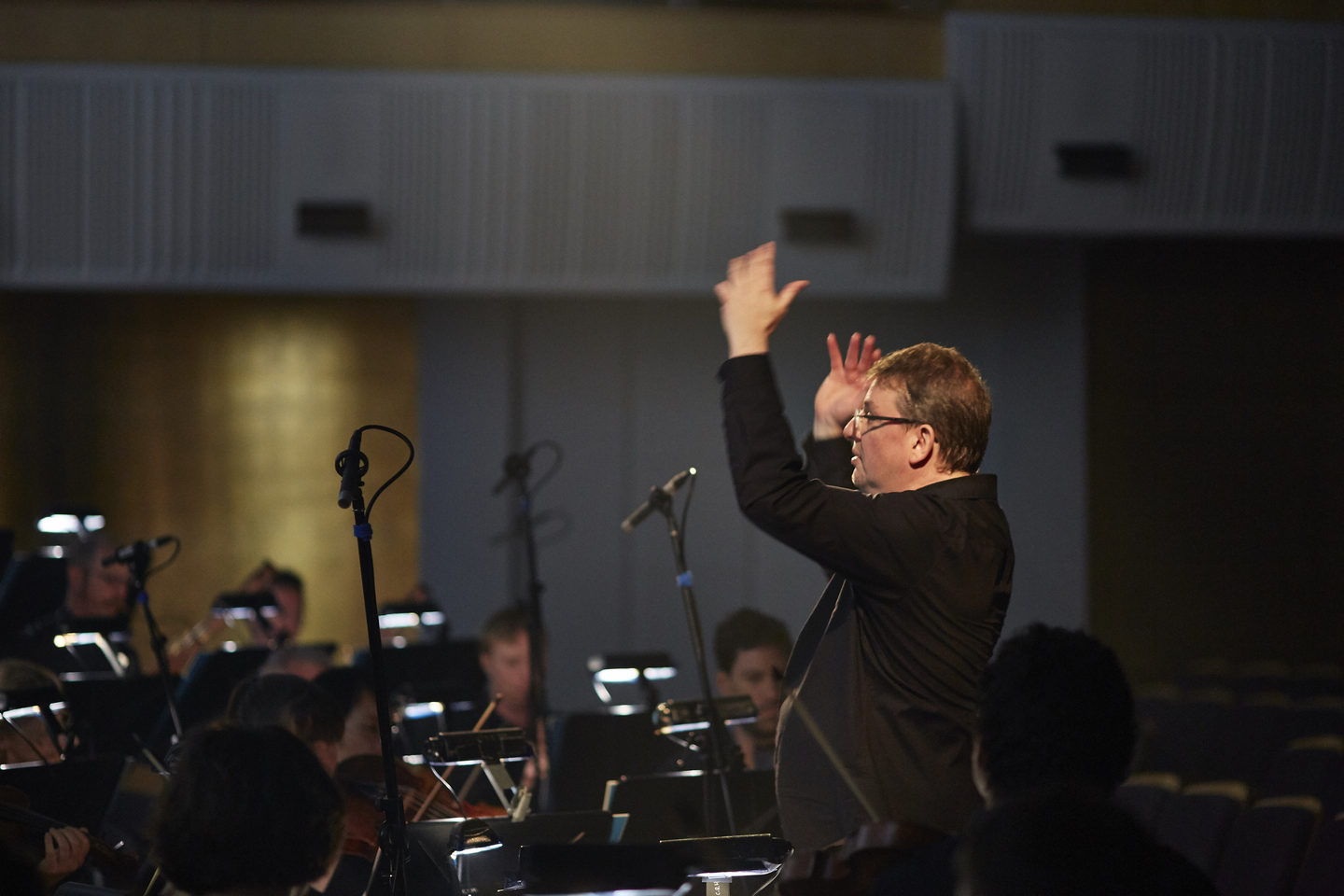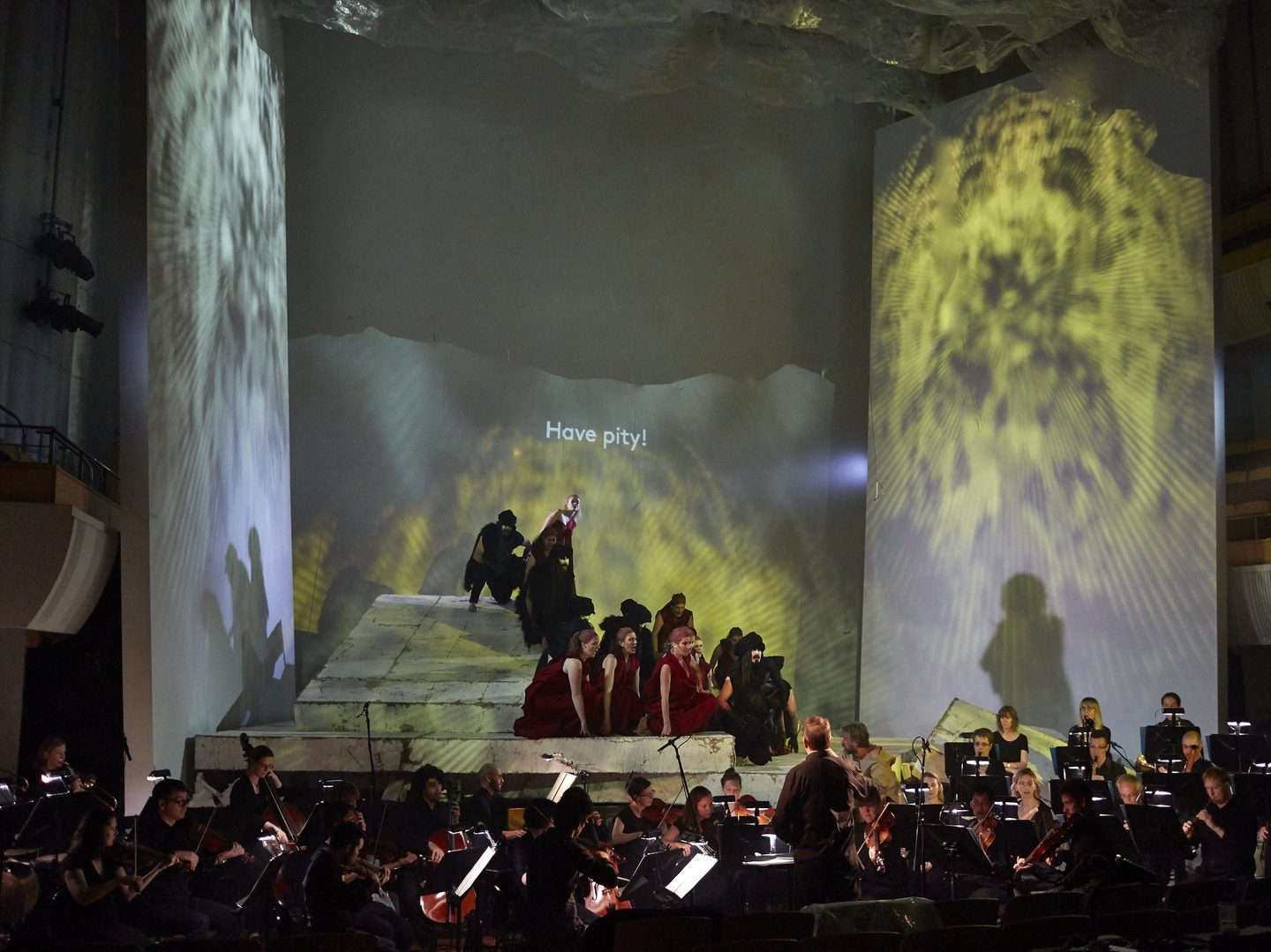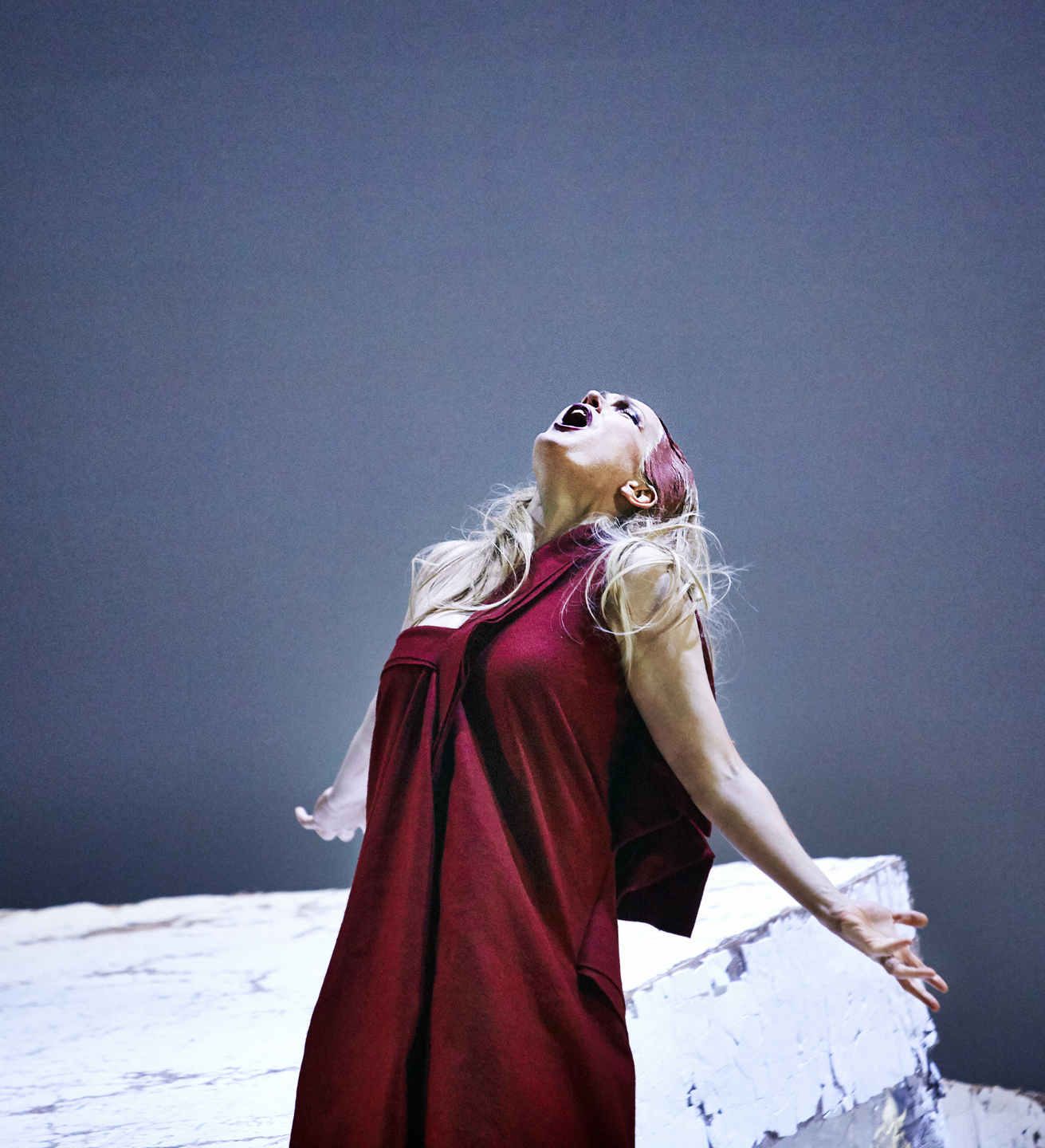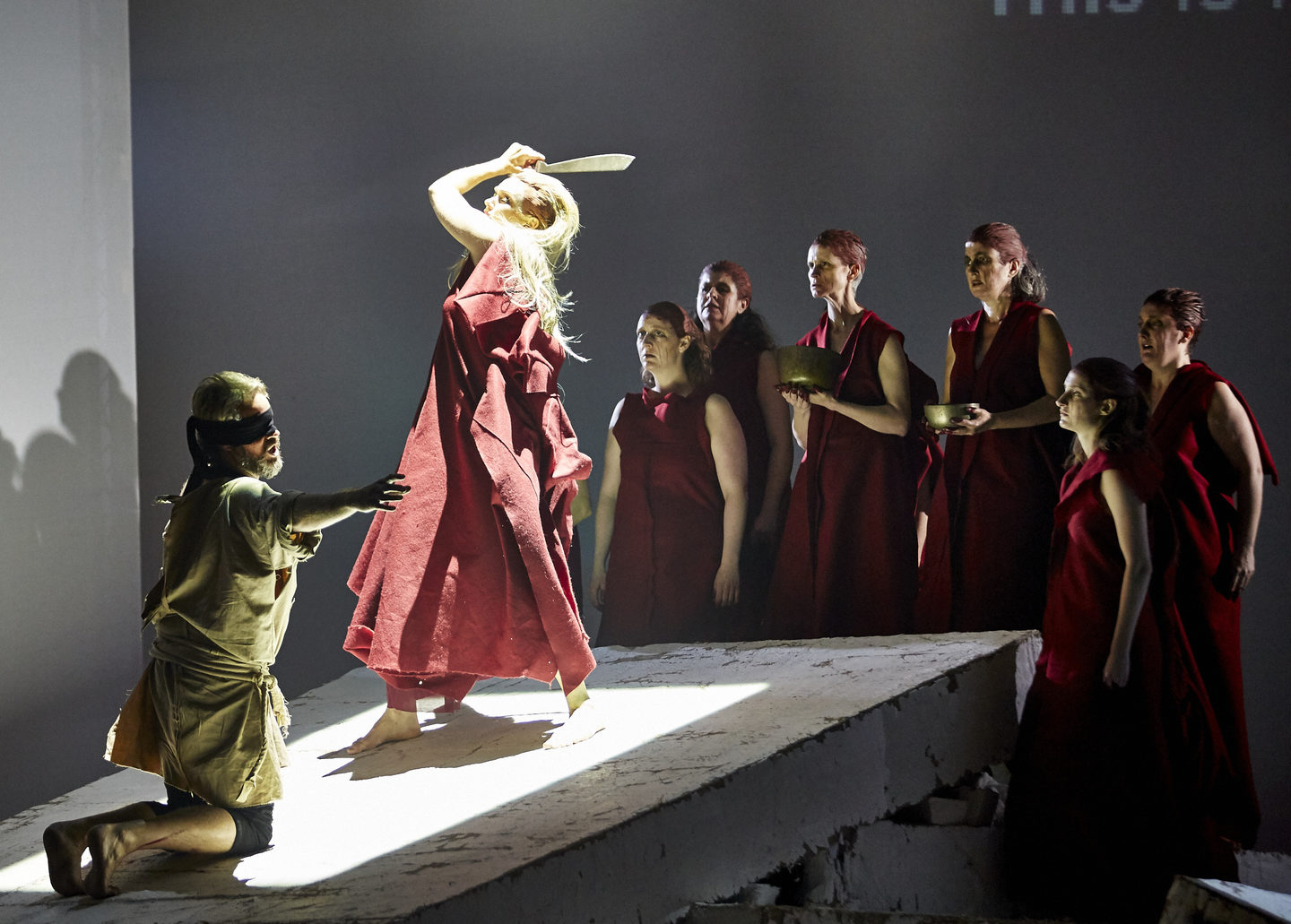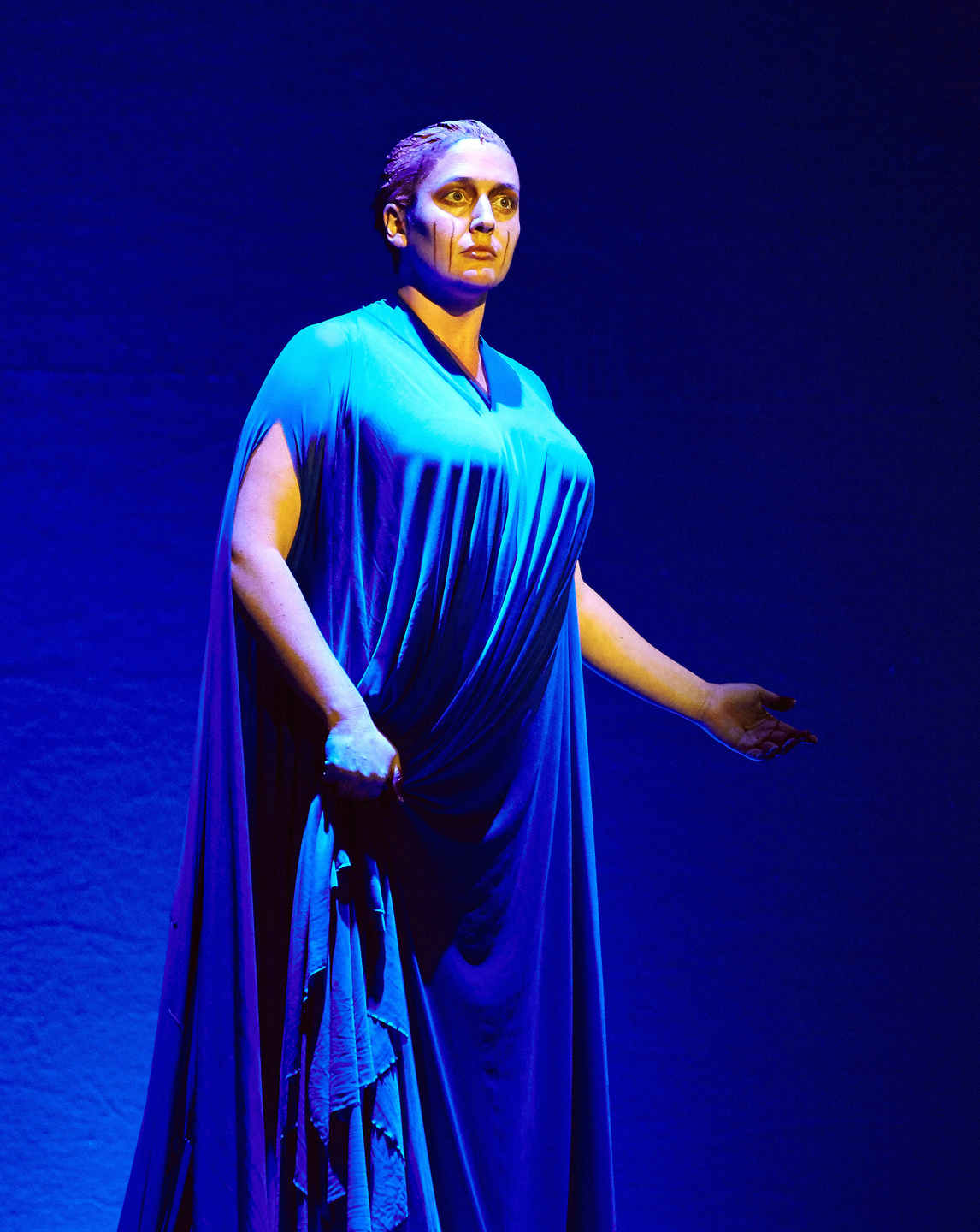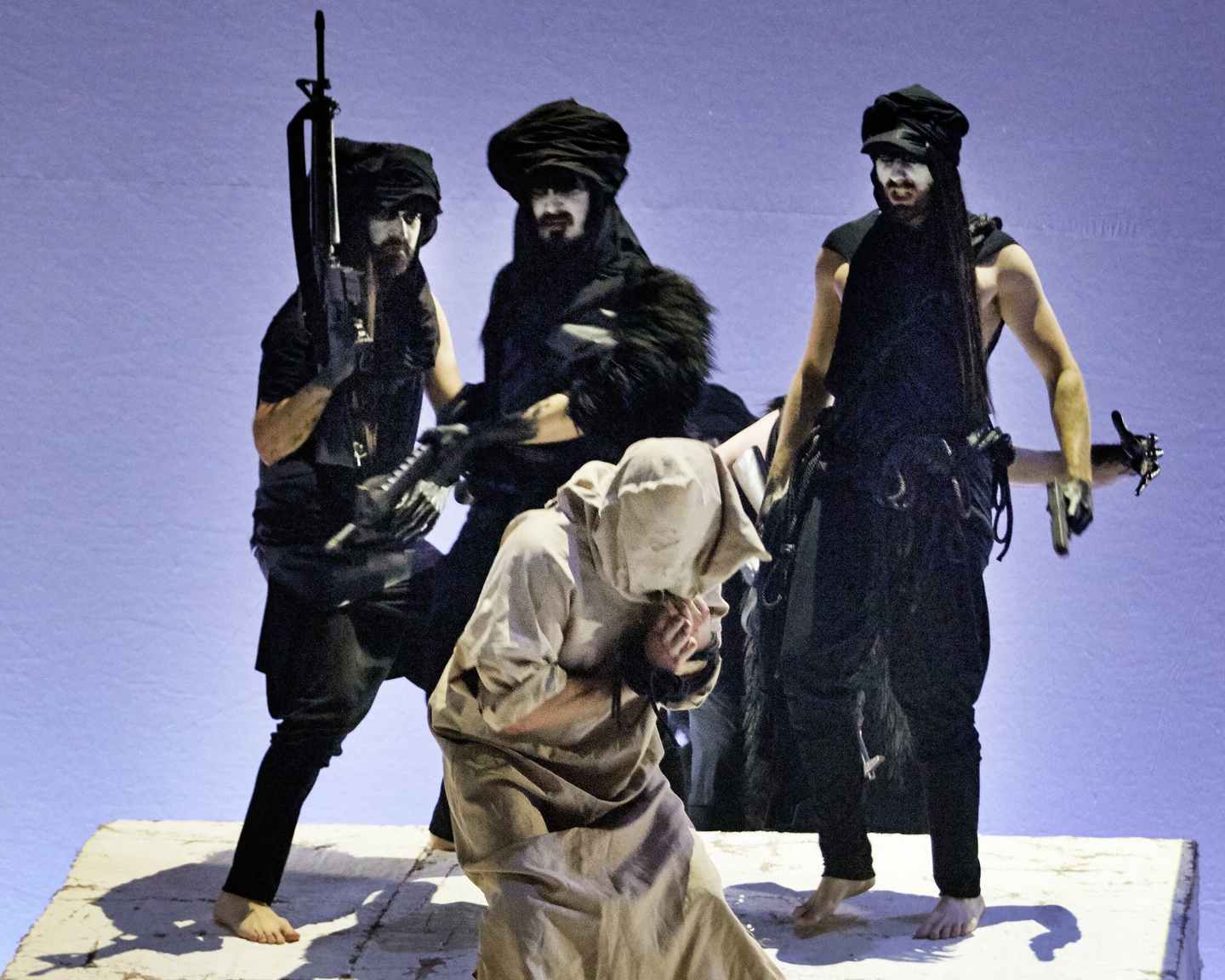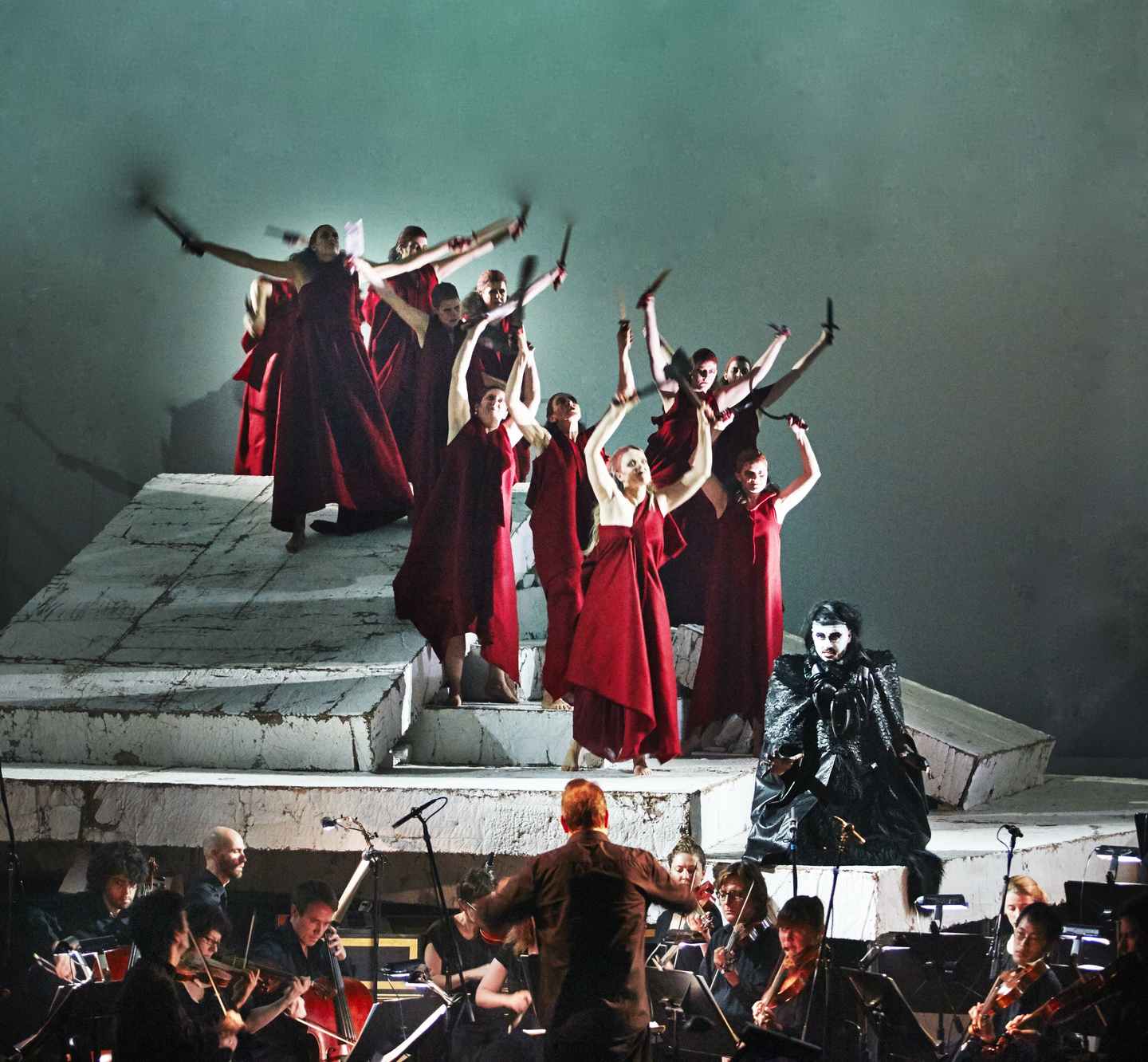Iphigenie En Tauride
libretto by Nicolas-Francois Guillard
Iphigénie en Tauride draws all of Gluck’s opera reforms to their natural conclusion and a work of great power and beauty is the result.
Dec 3, 5, 7 & 9 2014
City Recital Hall Sydney
Gluck's Iphigenie En Tauride
As our second performance in 2014 we performed Gluck’s Iphigénie en Tauride. This is a masterwork, rarely performed and understood. 2014 marks 300 years since Gluck’s birth and we wanted to mark this occasion with a work by a composer who is only remembered for a couple of pieces.
Iphigénie en Tauride is Gluck's most dramatically involving work. It is about familial love and deep friendship, but the waters run deep, and noble aims of sacrifice, duty and protection are played out within the taut drama. Containing much of Gluck's best music; the title character was sung by Caitlin Hulcup who brought the title role of Griselda to us to great acclaim. We’d been looking for a role to bring her back to our audience, and she was a standout in the role of the priestess Iphigénie. Joining Caitlin was Australian baritone Grant Doyle, Brisbane tenor Christopher Saunders, Sydney mezzo Margaret Plummer and Sydney bass baritone Christopher Richardson.
Pinchgut assembled a wonderful team, the Orchestra of the Antipodes on period instruments and the acclaimed chorus Cantillation all under the baton of Co-Artistic Director and conductor Antony Walker. Artistic Director of Opera Queensland, Lindy Hume, together with set designer, Tony Assness, costume designer Alistair Trung, and lighting designer Matthew Marshall, teamed up to bring us a beautiful and moving production of this deeply-felt Greek tragedy.
REVIEWS
READ
1] Synopsis
When Agamemnon gathered the Greek armies before the Trojan War, the goddess Diana (Diane) sent unfavorable winds to prevent them from sailing. Her oracle set a condition: to earn the right to sail forth, Agamemnon must sacrifice his daughter. He accepted these terms and killed his young daughter Iphigenia (Iphigénie) on the altar. In his play Iphigenia in Tauris Euripides imagines that Diane saved Iphigénie and delivered her to distant Tauris (Tauride), where Iphigénie served the enemy Scythians as Diane’s high priestess— but Iphigénie’s family believed her dead.
ACT I
Fifteen years later, a storm batters Diane’s temple at Tauride. Iphigénie and the other priestesses—all of them captives from Greece—ask the gods for safety and peace from the storms raging both outside and within their hearts. Iphigénie relates a dream: her home was destroyed; her father was killed by her mother, Clytemnestre, who gave her a dagger; her brother Oreste cried out to her for help, but she was forced to kill him. The priestesses grieve with Iphigénie and urge her not to lose hope that she will see Oreste again (“Ô toi qui prolongeas mes jours”).
The Scythian king, Thoas, comes to Iphigénie in despair, followed everywhere by omens and voices calling for his downfall. Oracles have ordered him to sacrifice every stranger to the country to end his torment. His soldiers come with news of new captives—two Greek men—and Thoas orders Iphigénie to kill them on the altar. The Greeks are brought in: one is half-mad, haunted by past crimes, the other defies Thoas. They are imprisoned as the Scythians call for blood.
ACT II
The strangers are Oreste and his lifelong friend Pylade. Oreste, who has killed his mother and is pursued by the Furies, lives on the edge of madness; now he feels responsible for Pylade’s imminent death (“Dieux qui me poursuivez”). Pylade calms Oreste with the pledge that they will die together (“Unis dès la plus tendre enfance”). Pylade is taken away, and Oreste sinks gradually into sleep (“La calme rentre dans mon coeur”). But the Furies stalk him even in his dreams. He awakens from a nightmare to find Iphigénie standing before him. Without revealing her identity she questions him about the royal family in Mycène, and he tells her all: Clytemnestre murdered Agamemnon to avenge the death of Iphigénie, Oreste struck down Clytemnestre to avenge his father and then, he adds, Oreste killed himself. Iphigénie sends the stranger to be shackled to the altar, and—now without country, kindred or hope—mourns the loss of her family (“Ô malheureuse Iphigénie”).
ACT III
Iphigénie feels a strong kinship with the prisoner (“D’une image, hélas!”). She resolves to save at least one of the captives and to send the survivor to Mycène with a letter for her sister, Electre. Pylade, who has been tortured, is reunited with Oreste, and Iphigénie tells them Oreste must live and carry the sealed letter (trio: “Je pourrais du tyran”). Pylade is happy to die for his friend’s life (“Ah! mon ami”). Oreste, determined that he himself should die, seizes the sacrificial knife and threatens to take his own life if Iphigénie will not spare Pylade. Iphigénie gives Pylade the letter and helps him escape.
ACT IV
Iphigénie tries repeatedly to perform the sacrifice, but she cannot bring herself to harm the stranger and cries out angrily against Diane (“Je t’implore et je tremble”). Oreste is brought in (“Que ces regrets touchant”). Touched by Iphigénie’s sadness and her concern for him, he tries to encourage her to do her duty, calling out in the final moment, “Iphigénie, beloved sister, thus also did you perish at Aulide.” Sister and brother realize the truth. Thoas bursts in: Iphigénie’s plot has been discovered. He orders the Greek killed immediately and is about to sacrifice Oreste himself when Pylade returns with Greek soldiers to save his friend. Thoas is killed in the fray, which is halted when Diane herself appears to pardon Oreste, quiet the Furies, set the Greek women free, and send prince and princess home to Mycène—and the first happiness they have known since before the Greeks set sail for Troy.
2] Christoph Willibald Gluck: the composer who deserves better
Rupert Christiansen asks why Gluck's tercentenary will pass by largely unheralded in 2014.
Reproduced from The Telegraph UK (5 January 2014)
Opera lovers had a bumper time of it in 2013, with jamborees marking the centenaries of three great masters Britten, Verdi and Wagner. This year it’s a shame that we’re not celebrating equally loudly the 300th birthday of another composer whose importance to the development of the art form can hardly be over-stated – Christoph Willibald Gluck, born in an obscure German principality near Nuremberg in 1714.
Apart from Orfeo ed Euridice – or rather its Housewives’ Choice favourite “Che faro?”, as sung by Kathleen Ferrier – nothing by Gluck has ever been widely popular and he will doubtless always remain a specialist taste.
One can immediately hear why: his greatest music is marked by a measured dignity that doesn’t offer easy entertainment or sensual charm for audiences craving instant gratification. A reformer by nature and a neo-classicist at heart, he deplored the florid excesses and amorous intrigues of conventional 18th-century opera and aspired in works such as Iphigénie en Tauride and Alceste to return to something redolent of the moral and spiritual grandeur of Greek tragedy.
Rather than showy arias designed to show off prima donnas’ techniques framed by fanciful plots, Gluck cultivated a purified style shaped by expressive declamation, dramatic dialogues and solemn choruses, underpinned by simple orchestration and unchromatic harmonies.
He could write wonderfully rich melodies too (emanating from the throat of a Régine Crespin, the aria “O malheureuse Iphigénie” from Iphigénie en Tauride can be even more heart-rending than Orfeo’s “Che faro?”), but they are conceived not as applause-seeking highlights so much as soliloquies charged with emotional and spiritual intensity. One might sum it up by saying that Gluck took opera seriously.
As a result, his writings as well as his scores have certainly been of enormous influence: on Mozart in Idomeneo and the Masonic passages in Die Zauberflöte; on Rossini in his serious operas; on the Berlioz of Les Troyens, on Wagner in his quest for the high moral ground. Yet today, even though his modestly scaled works are relatively inexpensive to mount and easy to cast, opera houses seem to shy away.
There are reasons for this. The absence of any sensational element means that he’s not good box office, and modern producers don’t know how to handle such spare and chaste material. Another drawback, baffling to our contemporary sensibility, is his habit of arbitrarily introducing a God ex machina to resolve tragic dilemmas in his final scenes.
One notable recent attempt to grapple with these problems was made by the late German choreographer Pina Bausch, whose danced versions of Orfeo and Iphigénie en Tauride carried considerable force and gave the dramas a new theatrical dimension.
Some performance of Orfeo ed Euridice are planned for the Buxton Festival in the summer, and English Pocket Opera will be staging the same work with children at Central St Martin’s College of Art later this month.
But it’s sad that at his tercentenary, the oeuvre of this seminal figure isn’t being explored in any depth and that a major operatic institution such as Glyndebourne hasn’t had the courage to honour his achievement by engaging the likes of Sarah Connolly or Alice Coote – superb Gluckian interpreters both – for the title-roles of Alceste or Iphigénie en Tauride.
3] Christoph Willibald Gluck
‘Perfection’, said Shaw, ‘is inexhaustible. If ever a nation tried to extinguish Gluck, one of the attainers of perfection, by the simple British method of ignoring him, that nation is ourselves.’ Shaw, one of the most vividly communicative of Gluck enthusiasts, was here being excessively harsh to the British: Gluck, at the time of his death perhaps the world’s most famous opera composer, and now (I believe) opera’s most neglected and misunderstood creator of front-rank importance, has since 1787 been ignored in Britain neither more nor less than elsewhere.
In any discussion or examination of Gluck, paradoxes and contradictions abound. In the history and development of the operatic medium he stands as one of the key figures – the Bavaria-born composer, Bohemia-raised, Prague- and Milan-trained, who in Vienna in middle age succeeded, with Orfeo ed Euridice (1762) and Alceste (1767), in imbuing Italian opera seria with a new expressive directness and intensity, and who then, transferring his activities to Paris a decade later, effected a parallel achievement in the medium of the French serious opera.
His influence on Mozart was second only to Haydn’s (the Commendatore scene of Don Giovanni surely reflects Mozart’s thrilled response to the shattering, world-destroying final scenes of Gluck’s ballet score Don Juan and opera Armide). That on Berlioz is well-known, but then Gluck has stirred the enthusiasm of generations of composers, and always inspired the commitment of top conductors and singers. Yet, given that his body of works is far more various than generally recognised, the vast majority of those works are neglected. Orfeo and (to a lesser extent) Iphigénie en Tauride apart, most lie unperformed – in the case of several key early works, it could hardly be otherwise, since they can still be found only in manuscript.
In the minds of opera-company managements, Gluck is – Orfeo, again, apart – a great theatre-emptier. In the eyes and ears of many audience-members, critics too, he is, to put it bluntly, a great bore.
But to Gluckians the situation is mystifying as well as saddening. Part of its explanation may be that Gluck appears to have stood on the edge of various post-war fashions and gained little advantage from them. Before the last war Orfeo was the earliest opera in the repertory. Since then, the vast, previously little-explored continent of Early Music has been opened up. The earliest Italian beginnings of opera have been rediscovered; and Monteverdi’s Orfeo now claims the position, and status, that once belonged to Gluck’s.
Another explanation may lie in the very historical importance with which he is always credited. In the history books he is the Great Reformer of 18th-century opera – of the Italian opera seria, the supposedly overblown, immoral, tradition-riddled form in decline by the time Orfeo ed Euridice was first performed. Gluck’s preface to the 1769 first publication of Alceste (nowadays, however, assumed to have been written by Calzabigi, Gluck’s Orfeo and Alceste librettist) is one of the key documents of opera history, endlessly quoted, particularly the opening phrase: ‘When I undertook to write the music for Alceste, I resolved to divest it entirely of all those abuses… which have so long disfigured Italian opera and made of the most splendid and beautiful of spectacles the most ridiculous and wearisome’ – and the definition of Gluck’s overriding goal as the achievement of ‘a beautiful simplicity’. But in recent decades the same Early Music movement has successfully revived opere serie by Scarlatti, Handel (the greatest of all opera seria composers), Hasse, Jommelli, Traetta and others. These have won legions of new admirers; and so the whole idea that opera seria was always per se a hopelessly decadent art-form verging on dramatic meaninglessness because of rigid formal precepts and dependence on singers’ show-off has come under question.
Best now, I believe, to get rid of Gluck the Reformer altogether. Only then shall we fully re-possess Gluck the Innovator, Gluck the Revolutionary, the Gluck who inspired Berlioz, Shaw and all the others, the Gluck whose greatest feats of music-theatre combine ‘beautiful simplicity’ and an awesome, at times overwhelming theatrical power.
He was certainly not an early enactor of Reform. Born in 1714, he had his childhood in northern Bohemia after his father, a forester and huntsman of Bohemian origins, took up service there. (Czech was his first language, and his German, and subsequently Italian and French, were always said to be imperfect.) Gluck’s musical education and earliest musical experiences reflect the cosmopolitanism that was to mark his career: he studied and earned his living first in Prague, then Vienna, before departing for Milan. There he steeped himself in Italian musical modes and manners, being particularly influenced by Sammartini, and having his first opera, Artaserse (1741), performed. Thereafter he spent time in London (where he struck up a warm relationship with Handel), Vienna, Dresden, Prague, Copenhagen, and Naples, for much of the time as conductor of and composer for a travelling opera troupe, which he had joined in 1746.
Marriage to a wealthy Viennese merchant’s daughter, in 1752, enabled him to settle in that city; he became attached to the court, enjoying the inestimably valuable patronage of Durazzo, the Genoese nobleman and Maria Theresa’s theatre administrator. The Empress herself never really came to admire Gluck, though he taught her children and eventually won high office from her; she preferred the collaborations of her court poet Metastasio and Hasse – the ‘old guard’, also resident in Vienna – to the ‘avant garde’ that was forming around Durazzo, and which, alongside Gluck, included the Livornese Calzabigi and the Florentine dancer and choreographer Angiolini. In spite of this, Vienna was to be his home for the remaining 35 years of his life, even during the 1770s, when he was bent on conquest of the Paris operatic stage.
The extent and variety of Gluck’s compositional experience as man of the theatre are insufficiently recognised: how can they be, when the works of the first two decades of his career, the 1740s and ‘50s, are still so little known? During this time he produced Italian opere serie (the astonishing La Semiramide riconosciuta of 1748, his setting of an extant Metastasio libretto, provoked the poet to describe the music as ‘arcivandalistica insopportabile’ – ‘vandalistic to the last degree, unbearable’!); pièces d’occasion, such as serenate and feste teatrali; new airs for the Parisian opéra-comique texts that became fashionable in Vienna; and much music for the ballet. All this activity was carried on before, alongside, and even after the creation of Don Juan, the Molière-inspired bombshell of a pantomime-ballet that Gluck and Angiolini dropped on an unsuspecting Vienna Burgtheater on 17 October 1761, and then of Orfeo the following year, the opera that was later taken to mark the start of the whole Reform movement.
Yet well before its premiere, opere serie such as Semiramide riconosciuta, La clemenza di Tito (1752) and L’innocenza giustificata (1755) reveal Gluck as not just an exceptional master of the form, but one determined to bend the rules in the service of dramatic heightening. And three years after Orfeo ed Euridice, he could ‘backslide’ with Telemaco, an opera seria of exceptional freedom and variety, in its way deeply stamped by the new ‘beautiful simplicity’ purveyed in Orfeo. Julian Rushton has called the monumental Alceste ‘an alternative form of opera seria’ and ‘at once Gluck’s greatest achievement and his most intolerable’. Gluck’s grandest, noblest conception, it reflects in every bar not just a love of the ‘high’ operatic art-form but a determination to dare everything in renewing it.
In this opera, according to the already-mentioned 1769 preface written by Gluck (and Calzabigi), Gluck claims to have essayed the purification of abuses ‘introduced [into the Italian opera] either by the mistaken vanity of singers or by the too great complaisance of composers’. He then lists some of those abuses: aria forms with repetitions that arrest the flow of drama; ornamented passages of vocalises placed to display singing technique rather than advance dramatic situation; contrasts between recitative and aria that break rather than increase ‘the heat of the action’; overtures that fail to forewarn the spectators of the ‘nature of the action to be represented’.
Certainly, the unrelievedly dark D minor overture of Alceste, its vast choral edifices (such as the mourning scene of Act 3, probably the grandest in all opera) and its heroine’s vocal line bare of ornateness, show Gluck and Calzabigi ceaselessly confronting and contradicting convention. Yet for all that, the stately pace of the opera, inclusion of secco recitative (a basic of opera seria) and use of confidants for both king and queen support the belief that the underlying intention was to make opera seria newly theatrical, not sweep it away. Re-invigoration, not Reform.
Indeed, I’d say the idea that Gluck and his collaborators could ever have intended the latter is one of the many misunderstandings that arose posthumously, along with the various moralistic and nationalistic ‘agendas’ about Reform that became prevalent in the 19th century and after. Even so, the history books are not all wrong: something momentous did indeed happen in Vienna, in the 1760s, in Don Juan, Orfeo, Alceste. In his years of writing dance music and supplying light songs to satisfy the Parisian-Viennese opèra-comique fashion, Gluck had learned to compress and reduce to essentials his melodic and related musical techniques. The first mature fruit of this compression was the 1761 ballet-pantomime – The Stone Guest, or Don Juan is its full title – which has proved to be quite as significant in the history of the dance as Orfeo in that of opera. No earlier ballet score tells a continuous story exploring the range of plastic, plain-speaking expressiveness found in Don Juan; no earlier ballet-score builds up so ‘continuous’ a sense of drama. (Sémiramis, the little-known Voltaire-inspired ballet of 1765, a storehouse of invention that Gluck, an inveterate self-borrower, raided 23 years later in the writing of Iphigénie en Tauride, is even more plastic and more ‘continuous’.)
Almost exactly a year later came Orfeo ed Euridice. Nothing like the nakedness of its succession of scenes had been experienced in opera for a very long time – a C minor funerary chorus pierced by the hero crying his beloved’s name from offstage; arias of mourning and loss for the hero of extraordinary melodic plainness; scenes set in hell and then heaven that are atmospherically defined with the sparsest and starkest of means. Responding to the inspiration of contemporary French opera, with its chorus-rich and dance-punctuated forms and concern for a whole theatrical vehicle made of many parts, Gluck and his collaborators stripped away excess: Orfeo, Alceste, and Paride ed Elena – 1770, third and last of the Gluck-Calzabigi operas – may not be the first expressions of the new, Enlightened, purified Classicism in opera, but they are the fullest and clearest examples of it.
But the ravishing Paride ed Elena, a different kind of piece from its predecessors, concerned with the erotic rather than the tragic, failed in Vienna. This turned his attentions to Paris, where his former pupil Marie-Antoinette was now queen; and there he succeeded in achieving a thorough-going, undeniable Reform – that of the tragédie-lyrique, the ‘high’ but moribund French operatic form.
The problem that faced him in Paris, unlike in Vienna, was one of ossified repertory and, as a result, performing standards in deep decline. His task was to convert the Paris Opéra from (in Julian Rushton’s words) ‘a museum into a place of musical novelty and dramatic vitality’. In composing for the Opéra and getting performed there (by means of unprecedentedly long rehearsal and occasional violent confrontation with his performers) Iphigénie en Aulide (1774), the radical Paris revision of Alceste (1776) and Iphigénie en Tauride (1779), his single most tautly focused music-drama, Gluck accomplished this renewal.
But side by side with these Classical tragedies, he produced a series of works – the Paris expansion of Orfeo (1774), Armide (1777), and Echo et Narcisse (1779) – in which the decorative, dance-dominated nature of the tragédie-lyrique is both celebrated and fired with long-lined dramatic purpose. These works were less universally admired (the failure of Echo, Gluck’s final opera, brought the end of his opera-composing career); not long ago it was customary to consider them swervings, aberrations even, from the main path. Now, however, in the wake of revived interest in Gluck’s predecessors in Paris – Lully and Rameau above all (both of whom he admitted to studying hard before tackling the first Iphigénie) – it’s possible to see just how much he owed to French tradition, and just how greatly he transformed it.
Mention of Rameau, though, orchestrator of brilliance entirely out of Gluck’s reach, brings up another of the Gluck paradoxes. ‘He knows no more of counterpoint than my cook Walz’, Handel is often quoted as having said of Gluck after performances of the London opera La caduta de’ giganti (1746). Comments about sketchy technique, and about the errors (parallel fifths and octaves, principally) to which generations of academicians have pointed accusingly, are wholesale in the Gluck literature. Was the famous plainness of style that became his signature – the extraordinary ability to force dramatic and, indeed, psychological revelations out of repeated notes and figures, the sudden applications of single splashes of woodwind colour, the vocal lines at times almost like folk song in their simplicity – the result of limited talent?
Again, it’s my contention that if those who commented thus had got to know Gluck fully, including his early works, such judgments would have become more guarded. His gift for trademarking a particular style for a particular subject is evident early, as becomes clear when the whole career is surveyed; and in the so-called Reform operas, Italian and French alike, the subjects demanded and rewarded ‘beautiful simplicity’ of musical sound and substance. In the right performance conditions these operas are heard and seen to represent some of the most acute balancing acts between music and drama in the complicated history of opera.
But ‘beautiful simplicity’ – the exigent thinness of means with which those balances are held – offers executants no leeway, no easy lapse into comfortable routine, no chance either to parade technical skills or conceal technical shortcomings. ‘To play Gluck heroines’, Berlioz once wrote, ‘it is not enough to have genuine talent – nothing less than beauty and genius will do.’
In this respect, one ray of light brightens the gloom. In the last two decades, having tackled Monteverdi, Bach, Handel and Rameau, period-conscious performers have arrived at Gluck. Much more of his repertory needs to be explored in this way, but already there have been sometimes revelatory results. Gluck the Wagnerian Precursor has had to be abandoned; this process has not been without loss, since the calm, slow grandeur that such great Gluckians of the past as Fürtwängler, Frida Leider, and the mezzos Alice Raveau and Margarete Klose could attain in his music – records show them doing so – is a characteristic not to be recaptured under the Early Music dispensation.
In general, however, gain surely outweighs loss. In, for instance, Naxos’s Vienna Alceste recording, conducted by Arnold Östman, or the new Telarc Iphigénie en Tauride from Boston Baroque, devices of colour, vocal characterization and figuration repetition become newly and immensely potent. The operas, placed ‘historically’, have seldom been unfolded as such concentrated, direct-striking wholes. Shaw’s word ‘perfection’ suddenly makes sense; Calzabigi’s summing-up of Gluck operas – ‘mighty passions at boiling point’ – has seldom seemed more accurate.
Max Lompert

ARTIST INFORMATION
Caitlin Hulcup Iphigenie
Grant Doyle Orestes
Christopher Saunders Pylades
Christopher Richardson Thoas
Margaret Plummer Diana
Conductor Antony Walker
Director Lindy Hume
Designer - scenery Tony Assness
Designer - costume Alistair Trung
Lighting Designer Matthew Marshall
Cantillation, chorus
WATCH
Gallery
We acknowledge the traditional owners of the land on which we work and perform, the Gadigal people of the Eora nation – the first storytellers and singers of songs.
We pay our respects to their elders past and present.
CONTACT
PO Box 291, Strawberry Hills, NSW, 2012, Australia
Ticketing and Customer Service 02 9037 3444 | ticketing@pinchgutopera.com.au
info@pinchgutopera.com.au

© COPYRIGHT 2002 - 2024 PINCHGUT OPERA LTD | Privacy Policy | Accessibility | Website with MOBLE

